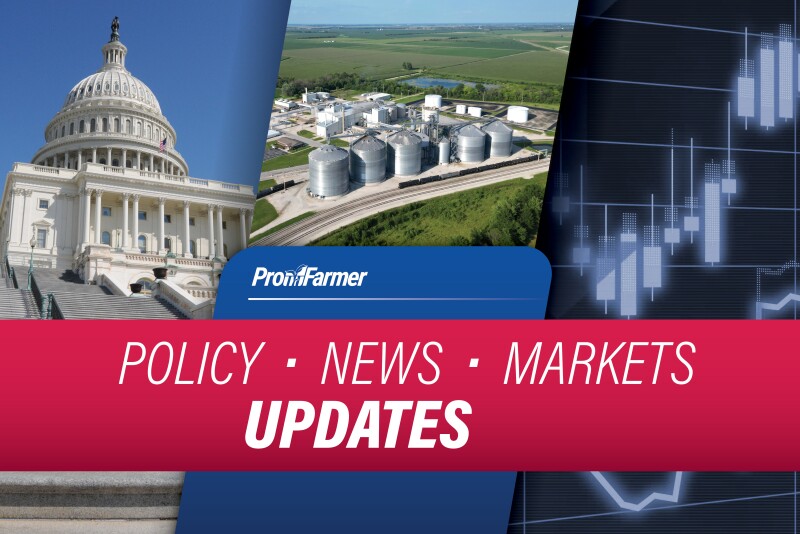U.S., China accuse each other of violating Geneva agreement... Trump on Friday accused China of violating an agreement with the U.S. to mutually roll back tariffs and trade restrictions for critical minerals.
China said Trump’s accusations were “groundless,” and promised to take forceful measures to safeguard its interests. In a sharp statement issued Monday, China’s ministry of commerce condemned new U.S. restrictions — ranging from AI chip and software export controls to student visa revocations — as a breach of recent agreements.
The flare-up comes amid uncertainty over a leadership-level call Trump says he hopes to hold with Chinese President Xi Jinping.
Trump to double steel tariffs on June 4... President Donald Trump announced Friday that the U.S. will double its steel import tariff from 25% to 50% as of June 4, reinforcing his protectionist trade agenda during a rally in Pennsylvania. The tariff increase will “even further secure the steel industry in the United States,” Trump said at the rally. “Nobody’s going to get around that,” he added. The move is designed to further shield the domestic steel industry as the U.S. finalizes a high-profile deal between Japanese-owned Nippon Steel and Pittsburgh-based U.S. Steel. “We’re going to bring [tariffs] from 25% to 50% on steel into the United States of America, which will even further secure the steel industry,” Trump said, adding that the agreement ensures U.S. Steel “stays an American company.”
Trump also praised Japan as “a tremendous friend,” emphasizing the job-creating potential of the deal, which he said will produce tens of thousands of U.S. jobs. His comments follow a string of other tariffs, including a 25% levy on all auto imports, exempting only companies expanding or relocating to the U.S.
As of 2023, the U.S. remains the fourth-largest steel producer globally, but also one of the largest steel importers, trailing only the European Union.
The European Commission swiftly condemned the decision. “We strongly regret the announced increase of U.S. tariffs,” a spokesperson told Reuters, warning that the hike “adds further uncertainty to the global economy and increases costs for consumers and businesses on both sides of the Atlantic.” The EU added that it may impose countermeasures in response and said the move undermines ongoing transatlantic trade talks.
Japan, U.S. to hold additional tariff talks before G7 summit... Japanese and U.S. officials have agreed to hold another round of trade negotiations ahead of the G7 summit later this month, after wrapping up their fourth round of tariff talks in Washington on Friday without a final deal.
Treasury Secretary Scott Bessent reaffirmed the importance of “addressing tariffs and nontariff measures, increasing investment, and working together to address economic security.”
The goal is to secure an agreement that could be jointly announced by Prime Minister Shigeru Ishiba and President Donald Trump during a sideline meeting at the upcoming G7 summit in Canada.
On economic security, Japanese Economic and Fiscal Policy Minister Ryosei Akazawa highlighted mutual interest in semiconductors and rare earths, saying both countries are working toward a resilient, complementary supply chain.
Japan is also weighing increased imports of U.S. soybeans, corn and defense equipment, while considering technical cooperation to revive the U.S. shipbuilding industry — an initiative backed by President Trump. A joint shipbuilding fund is also under discussion.
SCMP: U.S. retail giants press Chinese suppliers to ‘eat the tariffs’... In an exclusive report by the South China Morning Post (SCMP), U.S. retail giants including Walmart, Target, Nike, Puma and Adidas are now demanding their Chinese suppliers absorb 50% to 66% of the cost of new tariffs imposed under President Donald Trump’s trade agenda. The push marks a sharp shift from earlier agreements in April, when companies like Walmart had committed to covering the full costs themselves to keep supply chains intact during the height of trade tensions.
The aggressive cost-sharing demands come as U.S. retailers face political pressure at home not to raise consumer prices, while navigating an uncertain landscape under the current 90-day U.S./China tariff truce through mid-August.
A supplier in Zhejiang province told SCMP that although Walmart had previously agreed to cover tariffs through August, “there is no room” for the company to absorb more than 30% of the cost moving forward. Meanwhile, some brands are quietly shifting operations. Puma has trimmed direct shipments from China, while Nike and Adidas have signaled that price hikes are inevitable if tariff costs continue to rise. Target CEO Brian Cornell described price increases as a “very last resort.”
Bottom Line: The next 10 weeks will be critical: if no U.S./China agreement is reached before Aug. 12, tariff rates could return to 145% on Chinese goods and 125% on U.S. goods, drastically reshaping global retail sourcing strategies.
Industry groups continue to meet regarding EPA’s RFS proposal... The Trump administration’s review of EPA’s Renewable Fuel Standard (RFS) Program continues with the number of Office of Management and Budget (OMB) meetings with industry groups reaching at least 15.
Newly added meetings now include:
- June 3 – Growth Energy
- June 4 – NATSO (representing truck stops and travel plazas)
- June 11 – Advanced Biofuel Association
- June 12 – Union of Concerned Scientists
- June 23 – American Fuel and Petrochemical Manufacturers (AFPM)
AFPM’s June 23 meeting stands out, as the group generally aligns with the American Petroleum Institute (API), which met with OMB on May 27 to present its concerns about the RFS framework.
The spike in meetings signals continued lobbying over EPA’s finalization of its multi-year biofuel blending mandates. June has historically been the month when the agency releases proposed RFS volumes and the current pace suggests a release could still happen this month — if all scheduled meetings proceed as planned. However, delays are possible if sessions are canceled or rescheduled.
The breadth of participants — from petroleum groups to advanced biofuel backers — underscores the balancing act EPA faces as it shapes the next phase of the RFS.

